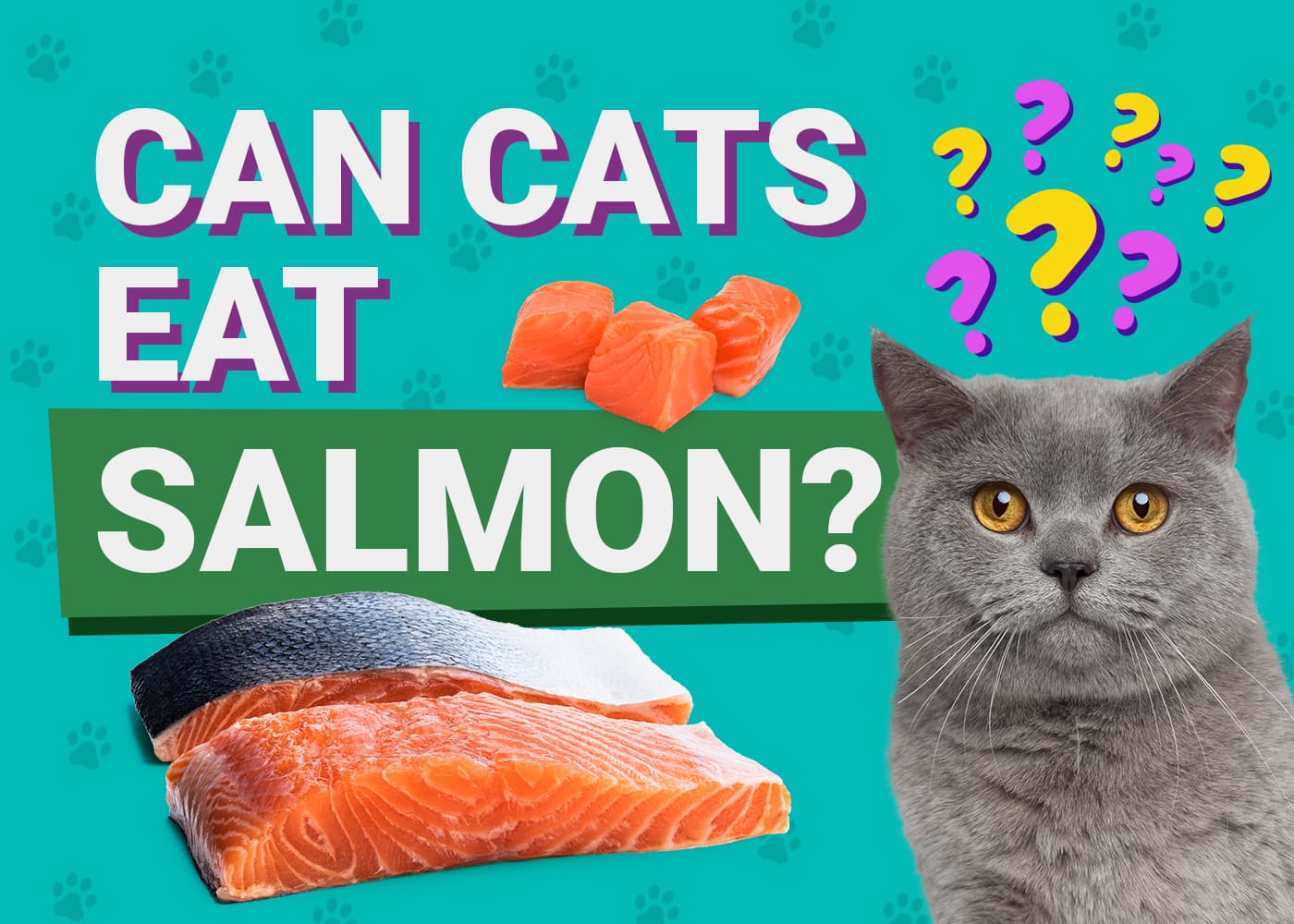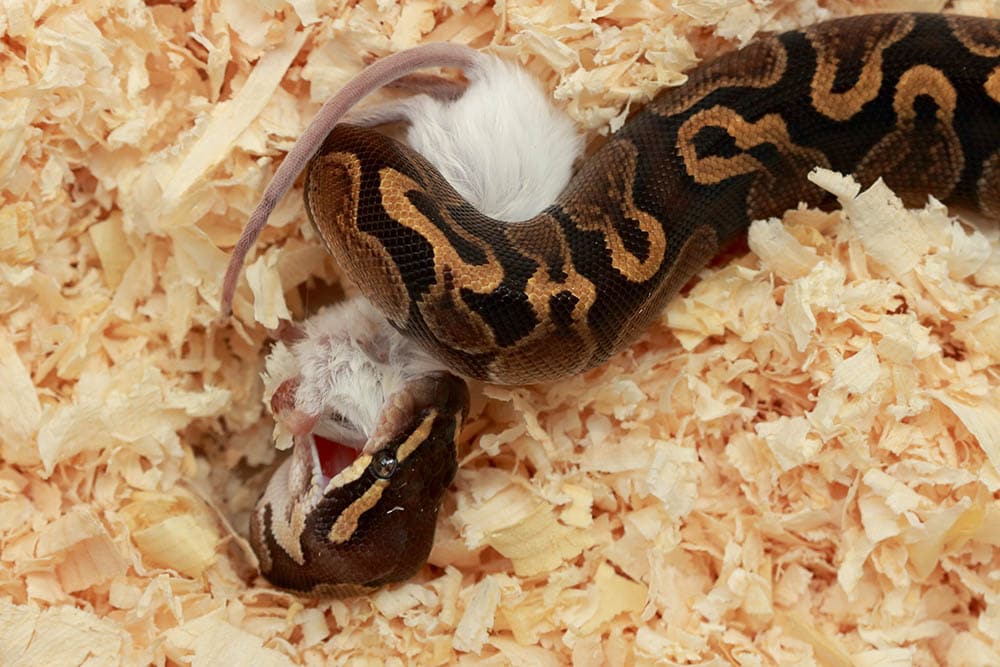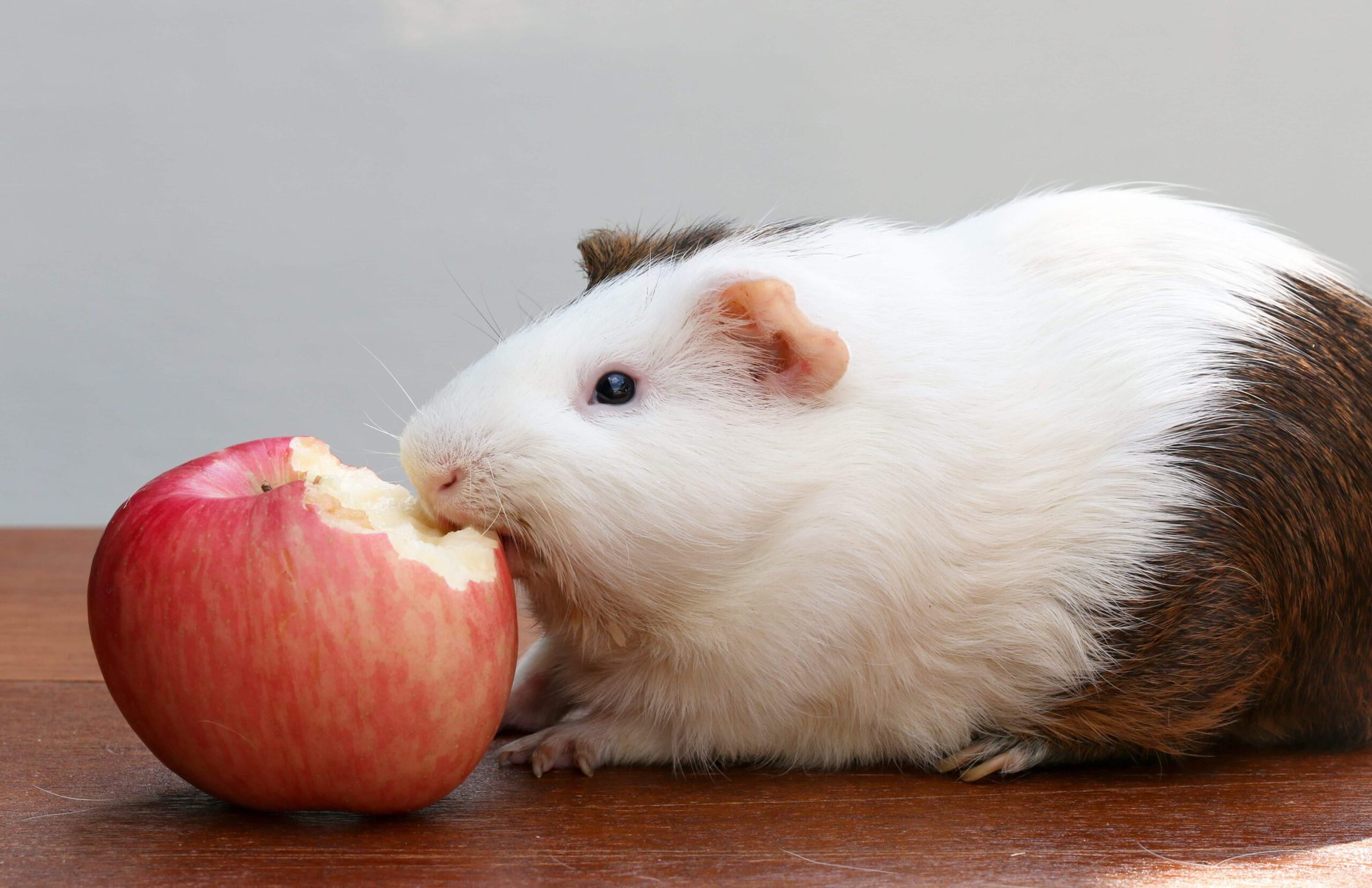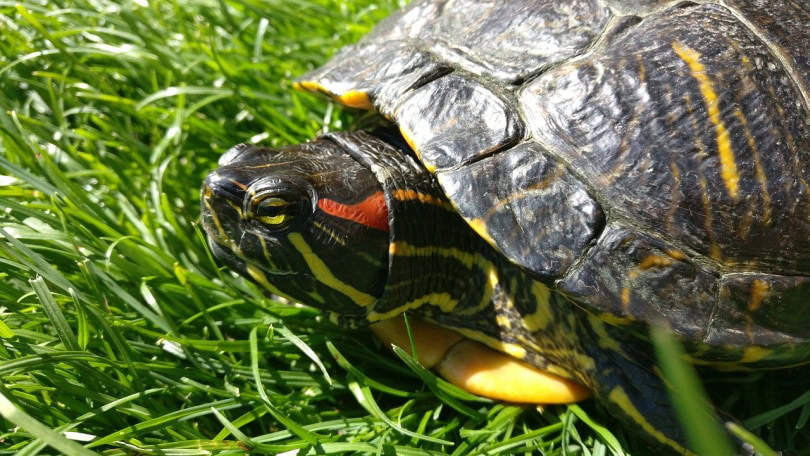VET APPROVED

The information is current and up-to-date in accordance with the latest veterinarian research.
Learn more »Salmon is a high-quality protein source for cats, and cats can eat it. It is also high in omega fatty acids, which are essential for your cat’s skin and coat. It isn’t odd to find salmon listed as the main ingredient in cat food or even suggested by your vet due to the health benefits.
However, your cat thrives on a varied diet containing many meat sources. While salmon is a high-quality option, your cat cannot live eating salmon alone. Some cats may benefit from salmon food more than others.
Can Cats Eat Raw Salmon?
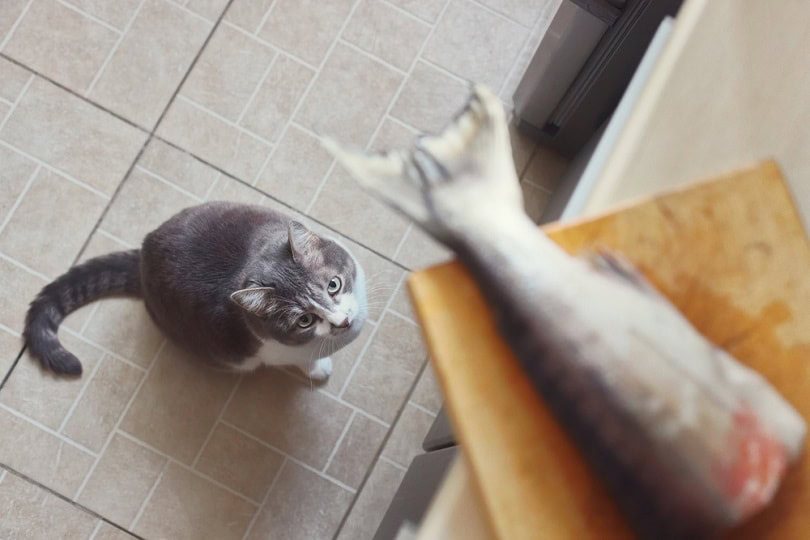
While salmon is an excellent option for felines, cats should never be given raw fish since it can be contaminated with food-borne pathogens that can make them sick. While many cats may be able to fight off the pathogens, it just takes one infection for your cat to become seriously ill.
Furthermore, they can pass on the infection to other cats and people through their feces. Since you’re likely scooping out their litter box, you’ll probably come into contact with the pathogen more likely than not.
There are also enzymes in raw fish that can destroy vitamin B1, which your cat needs in their diet. Consuming raw fish may block this vitamin your cat needs to thrive.
Can Cats Eat Canned Salmon?
Some canned salmon is okay for cats. However, many brands contain added sodium and oils to help preserve the fish. While fat is an essential nutrient for cats, salmon is already considered a fatty fish, and extra oils have too many calories for your cat’s daily requirements. Therefore, reading the label before purchasing canned salmon is essential—or you can skip the canned salmon altogether.
Can Cats Eat Smoked Salmon?
Smoked salmon is often cured with salt, so we recommend avoiding feeding it to your cat excessively. Instead, use only a tiny piece as an occasional treat.
Can Cats Eat Salmon Skin?
It isn’t that salmon skin is bad for them, but it can be a choking hazard in some cases. However, it’s an excellent source of omega-3 fatty acids. To avoid any issues, ensure you only feed your cat salmon skin if it is baked and cut into small, bite-size pieces.
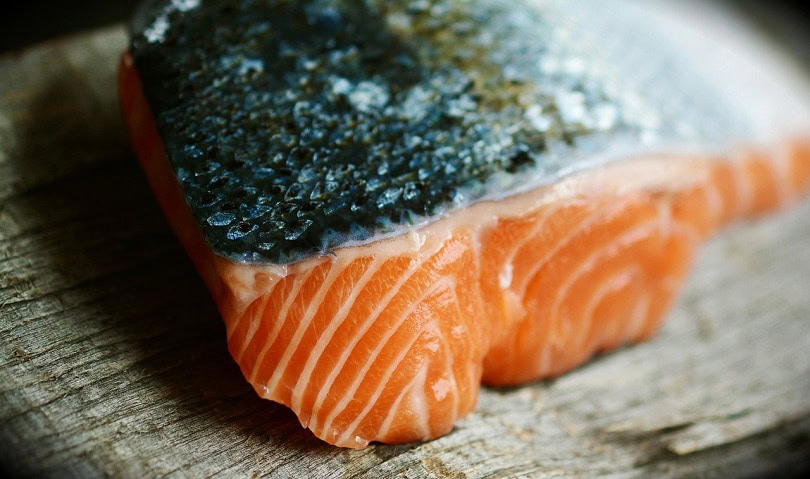

Is Salmon Good for Cats?
Salmon can be beneficial for cats in the right amounts. You don’t want to give your feline too much salmon, as it doesn’t contain the complete amino acid profile and protein balance your cat needs. It can be a very nutritious part of their overall diet, though.
Salmon is very high in omega-3 fatty acids, which have a range of benefits. This type of fatty acid helps protect your feline from skin and coat problems. It may also support your cat’s immune system and brain health.
Salmon is also a source of vitamins and minerals, such as potassium, selenium, and B vitamins. Your cat needs all these micronutrients to thrive, and salmon contains plenty.
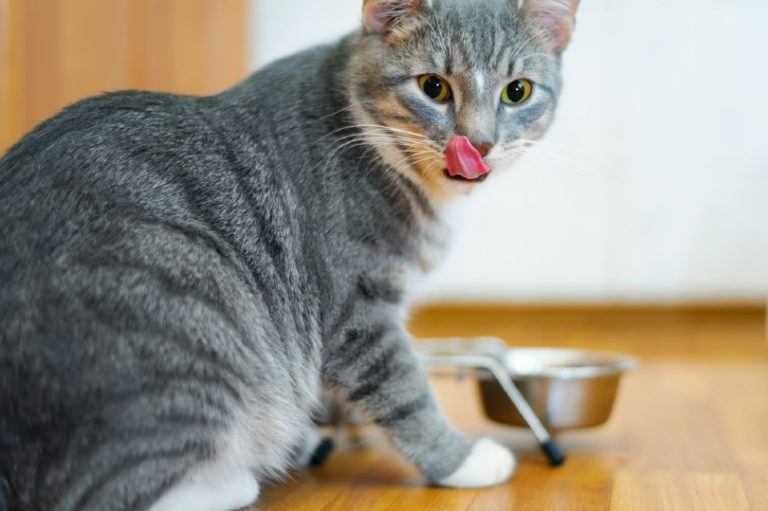
What About Mercury?
There is some controversy over feeding your cat food that contains mostly fish. After all, fish is relatively high in mercury. This wasn’t always the case, but it does seem that fish have slowly become more mercury-ridden since the Industrial Revolution. It is likely a matter of pollution, not how fish have evolved.
If your cat eats fish, they will consume some of the mercury. The mercury content of fish varies, but they receive some mercury from their environment. However, predatory fish that eat other fish are usually more mercury-rich than fish lower on the food chain.
Therefore, fish that eat plants are much lower in mercury than those that eat other fish. Salmon happens to be lower on the food chain. They also don’t spend their whole lifespan in the ocean, so they are pretty low in mercury.
Other Possible Problems With Salmon
Some claim that salmon is high in potassium and phosphorus, which can cause kidney problems. However, there likely isn’t enough to bother most cats. You only really need to worry if your cat has a history of kidney or urinary tract problems. We didn’t find scientific evidence to link a primarily fish diet with urinary problems.
Some cats may be allergic to fish, just like they may be allergic to any other type of protein. However, this isn’t necessarily a reason to avoid fish. Cat food allergies usually take the form of skin irritation or small fluid-filled lumps. If you notice these signs in your feline, you can talk to your vet about switching their food protein source. Unfortunately, you can’t avoid all the risks of allergies when feeding your feline. The most common food allergens for cats are beef, fish, and chicken.
Vitamin K synthesis may be a problem for felines that consume a diet mostly consisting of fish. Studies have found that kittens and nursing cats may become deficient if fed a commercial diet containing mostly fish. However, most diets contain added vitamin K. One study suggests that fish-based cat foods should be supplemented with at least 60 μg of vitamin K per kilogram of food. Many cat food companies do this today, so check the label before purchasing anything.
For some reason, a diet high in fish has been linked to hyperthyroidism in cats. Other protein sources have as well, including liver and giblets. Some cats prefer fish a little too much. They may refuse to eat anything else and demand only their favorite fish-flavored food.
You should always measure your cat’s food and avoid free-feeding. This is especially true for salmon, as many felines may consume too much. It’s just that tasty. We recommend feeding your cat twice daily and keeping track of their weight, body condition score, and general health to ensure they’re getting just the right amount of food.
Knowing exactly what your feline companion can and cannot eat will help you become the best pet parent. Recognizing that not all cat bowls are equal is also key! The Hepper NomNom Cat Bowl sets itself apart from traditional options by catering to the specific needs of cats. The innovative design offers whisker relief via shallow dishes and promotes digestion with a slight bowl elevation. Find out if the Hepper NomNom is right for your cat by clicking here. At PangoVet, we’ve admired Hepper for many years and decided to take a controlling ownership interest so that we could benefit from the outstanding designs of this cool cat company!

Summary
Salmon is a high-quality protein option for cats. It includes high levels of omega fatty acids, which can help with everything from skin and coat health to brain development. Fish oil is often included in most cat foods for this reason. Omega fatty acids are just as important for cats.
However, salmon can cause a few problems. For instance, it isn’t suitable for cats with kidney disease as it may be a bit too high in potassium. Some cats are allergic to salmon and therefore shouldn’t consume it.
Cats tend to like salmon a lot. This may be useful if you’re struggling to encourage your feline to eat. However, it can also cause your cat to eat too much, so we recommend carefully measuring out your cat’s food to avoid obesity.
Featured image credit: rjunqueira, Pixabay
